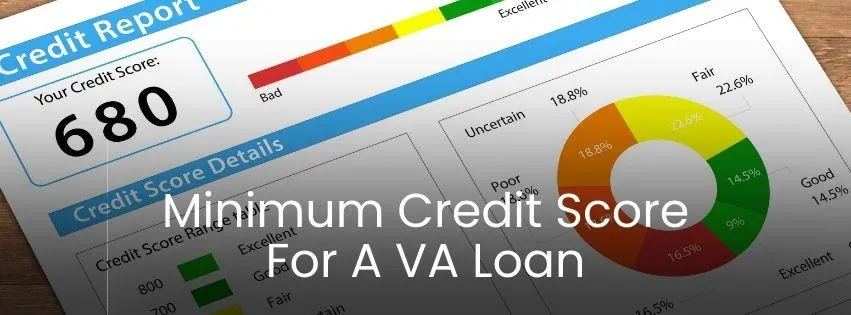
Minimum Credit Score For A VA Loan
If you're a veteran, active-duty service member, or eligible surviving spouse looking to purchase a home, you may be wondering about the minimum credit score for a VA loan. VA loans are known for their favorable terms, including no down payment and no private mortgage insurance (PMI) requirements. However, credit score still plays a crucial role in determining your eligibility for a VA home loan, even if you have bad credit.
What is the Minimum Credit Score for a VA Loan?
The Department of Veterans Affairs (VA) does not set a minimum credit score requirement for VA loans. Instead, it leaves the decision up to the individual lenders. Most lenders typically look for a credit score of at least 620, although some may accept scores as low as 580.
It's important to note that while the VA doesn't have a minimum credit score requirement, having a higher credit score can increase your chances of approval and help you secure better interest rates. A credit score of 740 or higher is considered excellent and can qualify you for the most competitive rates.
VA Home Loan with Bad Credit
Having bad credit doesn't necessarily disqualify you from getting a VA loan, but it can make the process more challenging. Lenders will look at your entire financial picture, including your income, debt-to-income ratio, and payment history, in addition to your credit score.
If you have bad credit, here are some steps you can take to improve your chances of getting approved for a VA loan:
Check Your Credit Report: Request a free copy of your credit report from the three major credit bureaus (Equifax, Experian, and TransUnion) and review it for errors. If you find any mistakes, dispute them with the appropriate credit bureau.
Pay Down Debt: High credit card balances and other debts can negatively impact your credit score. Focus on paying down your debts to improve your debt-to-income ratio and credit utilization.
Make Payments on Time: Late payments can significantly damage your credit score. Make sure to pay all your bills on time, including rent, utilities, and credit card payments.
Consider a Co-Borrower: If your credit score is low, adding a co-borrower with a stronger credit profile can improve your chances of approval and help you secure a better interest rate.
Provide Explanations: If there are extenuating circumstances that have impacted your credit, such as a job loss or medical emergency, provide a written explanation to your lender. They may take this into consideration when evaluating your application.
VA Loan Credit Requirements
In addition to meeting the lender's VA loan credit score requirement, your overall credit history and ability to manage debt obligations will be closely examined. Lenders will consider several factors when evaluating your creditworthiness:
Payment History: Lenders will review your rental and mortgage payment history over the last two years. Consistently paying your rent or mortgage on time demonstrates your ability to handle a new mortgage responsibly.
Recent Credit Activity: Your credit activity in the last 90 days, including payment history, unpaid balances, and monthly payments, will be analyzed to assess how well you manage various types of debt, such as credit cards, student loans, and car loans.
Employment and Residency Stability: Lenders prefer borrowers with stable employment and residency histories. If you're a recently discharged veteran with less than two years of job or address history, provide information about your deployments and military job experience to strengthen your application.
Federal Debt: Government-approved lenders will check your information through the Credit Alert Verification Reporting System (CAIVRS) to ensure you have no delinquent federal debts, such as student loans or previous VA loans.
Previous Foreclosures or Bankruptcies: VA guidelines allow you to qualify for a VA loan within two years of a foreclosure or Chapter 7 bankruptcy. This is more lenient compared to the three to seven years waiting period typically required for conventional or FHA loans.
Debt-to-Income (DTI) Ratio: While there is no strict limit on how much debt you can carry and still qualify for a VA loan, lenders generally prefer a DTI ratio of 41% or lower. If your DTI ratio exceeds 41%, the underwriter will need to evaluate your financial situation more closely to determine if you can afford the loan.
Alternative Options for VA Home Loans with Bad Credit
If you're having trouble qualifying for a traditional VA loan due to bad credit, there are alternative options to consider:
FHA Loans: FHA loans are government-backed mortgages with more lenient credit requirements. You may qualify for an FHA loan with a credit score as low as 500, although a score of 580 or higher is preferred.
USDA Loans: USDA loans are designed for low- to moderate-income borrowers in rural areas. Like VA loans, USDA loans don't have a minimum credit score requirement, but lenders typically look for a score of at least 640.
Subprime Mortgages: Subprime mortgages are designed for borrowers with poor credit, but they come with higher interest rates and fees. Be cautious when considering a subprime mortgage, as they can be risky and expensive in the long run.
The Take Away
While the VA doesn't set a minimum credit score for VA loans, most lenders prefer a score of at least 620. Having bad credit can make it more challenging to get approved for a VA home loan, but it's not impossible. By taking steps to improve your credit and exploring alternative options, you can increase your chances of achieving your homeownership goals.
Remember, your credit score is just one factor in the mortgage approval process. Lenders will also consider your income, employment history, and assets when evaluating your application. Working with a knowledgeable lender who specializes in VA loans can help you navigate the process and find the best financing option for your unique situation.

